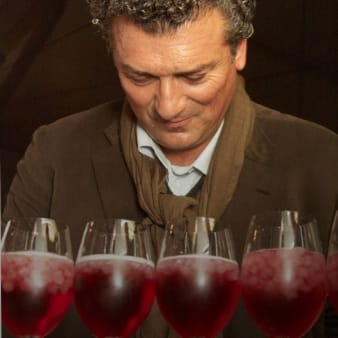-
!["Vigna del Cristo" Lambrusco di Sorbara DOC 2023 secco]()
“Vigna del Cristo” Lambrusco di Sorbara DOC 2023 secco
Very light red colour with a lively, persistent foam. Smells of wild strawberries, cherries, pomegranate juice, wild flowers and aromatic herbs. Fresh and fruity flavour, taut, dry and elegant. Beautiful length. SUPERIORE.DE
"Raspberry pink; notes of red berries, violets; red-fruity, juicy acidity, dry." Merum
"Bright cherry red colour with a brightening rim and a persistent head. A very inviting nose of cherries, almond flakes, a potpourri of violets and rose petals, with minimal earthy notes on the finish that add complexity. Excellently integrated perlage, juicy cherry fruit, light-footed yet complex, lingers for a long time, contemporary drinking pleasure." Falstaff
read more- Grape Variety: 100% Lambrusco Sorbara
- Cultivation: conventional
- Expansion: stainless steel
- Filtration: yes
- Alcohol content: 11,00 % vol
- Serving temperature: 8‑10 °C
- Storage potential: 2027
- Closure: natural cork
- Total extract: 22,65 g/l
- Total acidity: 7,86 g/l
- Residual sugar: 7,22 g/l
- Sulfite: 39 mg/l
- pH value: 3,28
- Allergens
contains sulphites - Nutritional Information per 100 ml
- Energy in kcal: 67 kcal
- Energy in kJ: 281 kJ
- Carbohydrates: 1,3 g
- Of which sugar: 0,7 g
stored air-conditioned07042523 · 0,75 l · 13,20 €/l · Price (DE) incl. VAT, excl. Shippingavailable immediately
!["Rosé del Cristo" Metodo Classico Sorbara DOC 2020 brut]()
“Rosé del Cristo” Metodo Classico Sorbara DOC 2020 brut
Not a Lambrusco, but a highly elegant and classically yeast-fermented spumante made from Lambrusco di Sorbara grapes: elegant pale pink colour, delicate aroma of rosehip and a hint of wild strawberry and raspberry. A lovely freshness on the palate with a fruity, long finish and great structure. SUPERIORE.DE
"Pale salmon pink; restrained; fine foamy, not really fruity, pastry, balanced, drinky." (JLF) Merum
read more- Grape Variety: 100% Lambrusco Sorbara
- Cultivation: conventional
- Expansion: 18 months on the yeast
- Filtration: yes
- Alcohol content: 12,00 % vol
- Serving temperature: 8‑10 °C
- Storage potential: 2027+
- Closure: natural cork
- Total extract: 23,20 g/l
- Total acidity: 9,17 g/l
- Residual sugar: 2,90 g/l
- Sulfite: 84 mg/l
- pH value: 3,37
- Allergens
contains sulphites
stored air-conditioned07042620 · 0,75 l · 26,53 €/l · Price (DE) incl. VAT, excl. Shippingavailable immediately

As with many Italian wineries, the history of Cavicchioli begins with the cultivation of grapes sold to a cooperative or other wineries. It was not until 1928 that Umberto Cavicchioli, the grandfather of today's generation, thought about changing his workshop and making his own wine, because he was sure that his grapes could deliver a better quality. In San Prospero, a village near Modena, he observed the stars and pressed his Lambrusco grapes himself, fermented them in barrels and filled his wines when he thought the moon was right.
Over the years, his Lambrusco di Sorbara has become a model wine for the region. After the Second World War, the company was rebuilt, already with the help of his four sons, to whom he bequeathed the now considerable company in 1964. In the 1970s the company began to export successfully and continued to grow. Umbertos son Piergiorgio became a pioneer of the Lambrusco Renaissance with the Lambrusco di Sorbara "Vigna del Cristo", a single layer Lambrusco.
The quality claim of the grandfather to whom the Cavicchiolis owes its fame has always been maintained. Even when Gruppo Italiano Vini took over in 2010, Umberto Cavicchioli's grandchildren remained in charge of the company. Claudio as plant manager and Sandro as oenologist.
The vineyards are always the basis of quality, which is why they are located northeast of Modena in the direction of the Po Delta, on the gentle foothills of the banks, on Sorbara and Salamino grapes, on limestone marl and sandy alluvial land, perfect for light, delicate and elegant wines. To the south, near Castelvetro, the soils are rocky, barren, with the Apennine foothills in the background. Here grows the variety Grasparossa, perfect for the fuller, darker Lambrusco. Basically, the microclimate is rather humid, which is why many of the vineyards are planted with pergola to improve the aeration of the grapes.
The reintroduction of sparkling production according to the so-called "Metodo Classico", i.e. classical bottle fermentation, is ambitious. In particular, the "Rosé del Cristo" Sorbara DOC 2012 Brut, pressed from Sorbara grapes, caused enthusiasm and high ratings among wine critics. SUPERIORE.DE

Facts
- Year of foundation: 1928
- Owner: Gruppo Italiano Vini
- Oenologist: Sandro Cavicchioli
- Annual production: approx. 10,000,000 bottles
- Vineyard: approx. 100 hectares, of which 70% Sorbara
- Conventional cultivation




